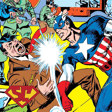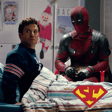Become a Creator today!Start creating today - Share your story with the world!
Start for free
00:00:00
00:00:01

Doomed! The Untold Story of Roger Corman's Fantastic Four
Before Josh Trank and before Tim Story, the legendary Roger Corman produced the first Fantastic Four film, but was paid to never release it. Now only existing in bootleg copies, Doomed! tells the story of how that film came to be and why it was suppressed for so long. Gordon Dymowski is back to discuss this documentary about the forgotten Fantastic Four.
---
Send in a voice message: https://anchor.fm/superherocinephiles/message
Recommended
Transcript
Audible's Free Trial and Superhero Audiobooks
00:00:00
Speaker
Hey, fellow superhero cenophiles. Did you know that almost 30% of adults say they haven't read a book in the past year? Primary reason why is a lack of time. Well, Audible's here to help with the gift of found time. Thanks to Audible, you can listen to audiobooks like Marvel Comics, The Untold Story, or Slugfest inside the epic 50-year battle between Marvel and DC.
00:00:19
Speaker
Read up on the history of superheroes in comics and movies with Grant Morrison's Supergods. You can also check out Vanguard, my original superhero novel series, or try The Vrilagenda or The Adventures of Fortune McCall, both of which were written by our duly departed host emeritus, Derek Ferguson.
00:00:35
Speaker
Whatever you're looking for, Audible has thousands of titles that you can consume while commuting, exercising, cooking, or just relaxing at home. And not only audiobooks, an Audible membership also gives you access to tons of content like podcasts, theatrical performances, and exclusive Audible originals that you won't find anywhere else. To give you a taste of what you can get, Audible is partnered with this show to provide listeners with a free 30-day trial.
00:00:59
Speaker
All you have to do is go to audibletrial.com slash SuperCinemapod and with your free trial you get one free audiobook and two free Audible Originals. In fact, you get to keep those titles even if you cancel before the trial is over. So what are you waiting for? Head on over to audibletrial.com slash SuperCinemapod and start your free trial today.
Challenges of Making a Low-Budget Fantastic Four Movie
00:01:32
Speaker
It was the seedy, dark side of Hollywood. The part of Hollywood that you just go, ah, why does it have to be like that, you know? Everybody that worked on this film, we all rolled the dice, thinking the game was fair, but it was rigged. We gambled with our heart and our soul and our artistic ability to make a really good movie the best we could with what we had.
00:01:55
Speaker
We were making a movie for probably around a million dollars of The Fantastic Four. And you just, you can't do that. You just can't. But we did. The heart of this film and the intentions behind this film, from the people who made the movie, not the business interests, the people who made the movie, their intentions were pure. They wanted to make a great Fantastic Four movie. This was gonna be a breakout movie for a lot of us.
00:02:24
Speaker
We make a film like this about a huge franchise like the Fantastic Four, then you're looking at an opportunity here to go, hey man, you know what? Look guys, we got a shot. I didn't know then, you know, all of the machinery that had been at work and that something so absurd like that, that all this effort and time and all the work that went into making that film and that it was never gonna see the light of day.
00:02:54
Speaker
strange, pointless, meaningless. I would hear, you know, this film was never really intended to be a film. And that infuriated me. I said, oh, yeah, you watch. Welcome to the Superhero Cinephiles podcast. I'm your host, Perry Constantine.
Adapting Fantastic Four: Failures and Opinions
00:03:17
Speaker
Welcoming back, another returning guest, and that is Gordon Damowski. Gordon, how you doing today?
00:03:22
Speaker
Pretty good, pretty good. How are you? I'm doing pretty good. Just, we were talking before we started recording, just trying to get everything situated for my family's upcoming trip to the States. But that's a, that's a rant for a whole other time probably. It said we've got a different kind of rant today and that's, we're talking about, so.
00:03:45
Speaker
The Fantastic Four I think may be the most cursed comic book property when it comes to live action adaptations. Everyone knows about the the Tim Story films, which
00:04:00
Speaker
let's say very inequality. I enjoy them for the most part, but a lot of people do not. And even though I enjoy them, there are definite criticisms to be had about them. And then of course there's Fox's ridiculous attempt at a reboot a few years back where they tried to make it dark and gritty and that just did not work at all. Go ahead.
00:04:27
Speaker
Yeah, I'm kind of the same way. I liked the two Tim Story fantastic horror films for what they were, which is, you know, Saturday afternoon, you sit back, you just kind of turn off your brain and go with it. Yeah. The one good thing I also didn't like the reboot, but the one good thing I will say about it
00:04:47
Speaker
is that encouraged me to seek out whiplash because any movie that involves J.K. Simmons verbally abusing Miles Teller for two hours, I am gay. That's a fair point. So I haven't seen whiplash yet myself, but I'll probably have to check that out one of these days.
00:05:07
Speaker
And yeah, the Tim Story ones, the first one especially is very, very rocky. Julian McMahon is totally miscast as Doom. But the second one, I enjoyed a lot more. I thought in that one especially, they'd really gotten the family dynamics right.
00:05:27
Speaker
You know, Jessica Alba still doesn't quite feel like Sue Storm, but but everybody else I thought really embodied their roles. I mean, you know, Chris Evans and Michael Chiklis, they got that in the first movie. And I think
00:05:41
Speaker
Ian Gruffett, I'm probably mispronouncing it. Yeah, it's Ian. It's spelled differently, but it's pronounced Ian. Okay, yeah. And he really, I really bought him as Reed more in the second movie. I felt he had really kind of grown into that role. Plus you got, you know, Lawrence Fishburne voicing the Silver Surfer, which is always fun.
00:06:01
Speaker
And Doug Jones did the actual mocap work, however they did that. Yeah, yeah. And, you know, Galactus Cloud aside, I thought that was a really enjoyable movie. Yeah, it was. Yeah, I think both of them were pretty good.
The Unreleased 1994 Fantastic Four Film
00:06:18
Speaker
But all that aside, the Tim Story Fantastic Four movie was not actually the first Fantastic Four movie, not the first live action one. The first one was filmed at the end of 92 into 93 and was never, never got an official release. And this was, it was produced by Roger Corman of all people and Bernd Eichander
00:06:47
Speaker
And after it was finished and it was made on a budget of like a million dollars. And after it was finished, I think it was like Marvel and Fox had paid like an extra million dollars to make sure that it never got released.
00:07:01
Speaker
Right. So this this and this movie, you know, if you've ever been to, you know, comic conventions, you have no doubt, you know, you've seen like the booths that are selling DVDs or back in the day VHS, you've no doubt probably seen some version of this with like
00:07:19
Speaker
you know, a cheap printout DVD case cover or something like that. You know, Roger Corman's Fantastic Four and all that. So you've probably seen it around. Maybe you've seen the movie itself because I'm sure it's probably on YouTube. And it is. You can find at least one copy, if not several on YouTube. OK, so I'm guessing you've seen you've seen the independent film. Yeah, I've seen the 1994 Fantastic Four movie and it's
00:07:49
Speaker
I think a lot of people have said it's like better than even the Tim Story films. I think for, if you look at it in the context of its time, it's not bad. It's just, you could tell that there could have been more money spent because it, I mean, the major expense is to think costume, which is as an actual animatronic head, which allows it to be expressive.
00:08:15
Speaker
But the rest of it is, and the acting's pretty solid. I mean, it's a solid B-movie. I would compare it to the two Tim Story films as it's in that same spirit, although I think it probably, I think if the Story films didn't exist, it's definitely better than the dark and gritty reboot.
00:08:40
Speaker
Yeah, I'll definitely agree with that. I don't think I'd go so far say it's, it's, it's better than the story films like some people do but it is definitely better than the, than the reboot was.
00:08:55
Speaker
I saw it years ago, right? This is like going back 20 years that I saw this movie. So it's been a while, but I remember not being very impressed with it. Even like the acting, I felt, if I'm remembering correctly, I think Alex Hyde-White did pretty good. Rebecca Stabb, I thought did pretty good. Jay Underwood, I think was the one who had really kind of gotten on my nerves watching this movie. Yeah, he overdoes it. It's like, you know, it's like you can pretty much tell he's,
00:09:25
Speaker
Um, and I know in the documentary doomed, he's like super hyper, but he, you could tell like this was his. Okay. Yeah. There's a scenery. I need to leave teeth marks on it. Yeah. And it was swing back when, way back when Derek and I, I think we're covering a black Panther and we were talking about how.
00:09:44
Speaker
Marvel has given a chance for two of the three human torch actors to kind of get another start. So, you know, they called up Chris Evans. He got to play Captain America. They called up Michael B. Jordan. He got to play Killmonger. And we were saying that Jay Under was just waiting by his phone, waiting for that phone call. Well, actually, he's a pastor out in California. Oh, OK. So it's probably not likely we're ever going to see him again in a film unless it's a pure flicks film.
The "Doomed" Documentary and Film's Mystery
00:10:12
Speaker
Oh, I didn't know he was into that stuff. But anyway, and so this. And then so what we're talking about today is actually not the 1994 Fantastic Four movie. But instead, we're talking about the documentary that was released about it, which is titled doomed. The true story, I think was the untold story of the Fantastic Four. Yes, that's
00:10:36
Speaker
So, and I had seen this documentary a few years ago. And then when you said you wanted to do it like this, this is actually the second documentary we're covering on the show. We talked about the death of Superman lives before. So where do you wanna go with this, Gordon? Well, I wanted to start with, you know, kind of why I chose this film. I think this film,
00:11:03
Speaker
I know there's a lot of documentaries like The Death of Superman Lives. There's another one about Richard Stanley and his attempt to make Island of Dr. Moreau. But I think part of it was just I kind of I'm a sucker for the this is the story that you wish you knew and
00:11:22
Speaker
I was actually there, like I was actually I remember very distinctly all the hype about this Fantastic Four movie. I mean, I was in my 20s when all this was happening, so I was like really looking forward to it. And I was also ironically, I happened to be
00:11:43
Speaker
part of when the producers were running like their Indiegogo and crowdfunding to put this movie out. So when it came out, I saw it when it was first released and I rewatched it this week. And I think this film says a lot, not only about the nature of the business, but I think it makes some points about maybe how Marvel runs its business both
00:12:10
Speaker
back then and kind of leading into now. And I just thought it was worth it just to see like, okay, there's this great mystery about why was the 1994 Fantastic Four movie never released? And why hasn't it been shown and what happened to it in the aftermath?
00:12:30
Speaker
Yeah, I had, I remember I was just starting to get into the comic book scene when this movie was starting to be promoted so that was 93 I was about 10 years old at the time, and I, I had been doing things like, you know,
00:12:46
Speaker
picking up, mostly I didn't really jump right into comics at first. I kind of like dip my toes in through things like wizard magazine and that kind of stuff. And I remember seeing like some write-up or something and they had one of the stills from the movie. I think they had two stills. They had one of the group shot and then they had one of, I think it was Dr. Doom was the other shot. And I remember seeing that and as a 10 year old kid, I'm like, oh cool, they're making a Fantastic Four movie. That'll be interesting. But it wasn't until,
00:13:15
Speaker
later I found out that, and then I never heard anything about it. So I just thought that, oh, I guess the movie was canceled. I guess it, you know, it just, they never finished it or something like that. And then it wasn't until years later that I found out, no, it was finished and it was released kind of, but mostly it was like these bootleg pirated copies. And the funny thing about the documentary is that it makes it clear that this movie was never
00:13:42
Speaker
released, and there were stories there was never intended to be released. And that even towards the end, what the director always as soon speculates that when they were doing, they send it out to a company to do dubs. And that basically the guy said, hey, fantastic for a movie, I'm going to make a copy and that this copy spurned another copy that spurned another copy that spurned another copy. And that, you know, for a while, you can only get it as like your your your grade Z,
00:14:12
Speaker
VHS kind of copy. The fact that it's on YouTube and Marvel has never pulled a copyright strike against it kind of tells you something.
00:14:23
Speaker
Yeah, yeah. And like you said, well, let's put this in the context of the times because nowadays, people who know more about the modern superhero movies, they're probably listening to us and they're thinking, well, why the hell would Marvel give the option to these like B-list movie studios anyway? And truth is, those are the only ones who were really buying back then.
00:14:53
Speaker
Well, we'll put it in further perspective. You first have the fact that Batman is like the major, major hit. And I think Batman Returns might have been out around this time. It was, yeah, 92. Yeah, you know, you've got other efforts hadn't really been that successful. And Marvel was about three years away from bankruptcy because they fell to 96. So they were looking for basically it was like,
00:15:23
Speaker
Yeah, they were short of I mean, they were they were to use kind of like modern terminology. They were this close to donating the rights to a little free library at this point, like they needed cash right away. And the documentary presents it is OK.
00:15:39
Speaker
Roger Corman's approached by Constantine Films, Burt Eichinkler, and Marvel, it's like, we need a fantastic four film, we need it done for a million dollars, and we need it to start production by, I think December 31st, in order for them to lose the rights. Yeah, and that's how this all got kicked off.
Marvel's Bankruptcy and Rights Sales Consequences
00:16:02
Speaker
Yeah. And for people who are listening to this and they're not, they don't really know what we're talking about. We're like, whoa, Marvel bankruptcy? Yeah. So in the nineties, Marvel had made some spectacularly stupid decisions. And they'd really kind of overextended themselves. They kind of, I think they kind of really bought into what was
00:16:23
Speaker
the 90s speculator boom and they thought that gravy train was gonna keep on running and it wasn't. And they had done things like they had bought toy biz. They had bought, I think it was Fleer they had bought as well. They had bought Malibu comics and a bunch of other things they bought up for really kind of stupid reasons. Like they bought Malibu just not because they wanted the characters or anything like that, but just because they wanted the digital coloring techniques.
00:16:50
Speaker
And it was just like all the, and basically they just kind of overextended themselves. And then they had to file bankruptcy because of that. And then eventually ToyBiz, ironically enough, bought Marvel back instead of the other round. Yeah. And it was also like this, what's funny is that this isn't like the first time there's ever been like, like you need to do something and something didn't get released.
00:17:19
Speaker
I was reading about how when Blazing Saddles came out, Mel Brooks had, he knew that Warners was gonna bug him for a sequel, but he didn't wanna do a sequel. So he said, let's do something crazy. Let's negotiate a clause where they like, we have to, they can't do a sequel unless there's a TV show that's developed six months within the release of the film, thinking Warners is never gonna do this, you can't do that. They ended up developing a pilot called Black Bart.
00:17:49
Speaker
with Lucas Jr. You can find it on YouTube, as well as on several Black Blazing Seattle's releases. And allegedly, there's like four years of a show that will never be seen simply because Warner Brothers wanted to hold on to the rights. Wow. It's I think this movie really kind of this and I think and what and the death of Superman lives really kind of
00:18:15
Speaker
detail the absurdity of the film business. And you're watching this movie and you're thinking, that can't be true, right? No, that's actually how things work in this business.
00:18:31
Speaker
Yeah, it kind of reminds me of a quote from Douglas Adams, and he was talking about, I'm gonna paraphrase, but it's basically like, he was doing a lot of frustrations around Hitchhiker's Guide to the Galaxy, developing that into a film. He said, the process of developing a film, it's like cooking a steak by having multiple people breathe on it. I mean, it's a very slow and arduous, and it's, I mean, the one thing that struck me about this film was how
00:19:01
Speaker
And you don't realize it like now, but back then, like all the the cast and crew had no idea what was going on. There's like no communication between, like, say the upper level production and what was going on on set. And now something like that happened, we would have like, you know, it would be on Twitter and Facebook and, you know, you'd have your YouTube hot takes about what was going wrong with the movie.
00:19:31
Speaker
So it just astounds me how they were. And you could tell it was kind of deliberate, but it really felt like they had no idea that what they were doing wasn't going to pay off. Yeah. And that's one of the things that really comes through in the documentary, because when I watched the movie,
00:19:52
Speaker
it had felt like I had gotten the impression, you know, mistakenly on my part that they didn't really care about this. And I had gotten the impression that, and maybe it was a part of it was Jay Underwood's overacting. Maybe think that just like, you know, they're not taking this seriously. But then you watch this documentary and you realize, no, no, they actually were really earnest about this. They were really, really passionate about this.
00:20:21
Speaker
And you could say, you know, misguidedly at times thinking that a million dollar movie is going to be their ticket to stardom. But well, you have to keep in mind, they were also working for Roger Corman, who at that point and still now he, you know, Martin Scorsese had worked for Peter Bogdanovich, Joe Dante, all these upper level
00:20:46
Speaker
Yeah, yeah, all these high level, like filmmakers actors had all gotten their start with him. So he had a reputation of being like a graduate school. He also had a reputation of being a very effective low budget filmmaker, where like his philosophy is kind of okay, do it as cheaply as possible.
00:21:09
Speaker
maximize what you have, and also follow up prevailing trends. Because if you look at a lot of his, the movies that he's actually either directed or been or produced, a lot of our clusters, like you've got your car films, your, your 50s horror films, your your Edgar Allan Poe films. I mean, it's I think it speaks volumes about
00:21:30
Speaker
And at the beginning of this documentary, Lloyd Kaufman from Trova says, hey, we had the opportunity to do this, but I didn't want to take off Stan Lee. And I'm thinking to myself, I now want to see a Fantastic Four movie produced by Trova, just for the heck of it. I mean, it probably can't be worse than the reboot, so we got that going for it.
00:21:56
Speaker
Yeah, and that's a good point. Roger Corman does have this reputation as being kind of like the, if you want to break into the business, you work for Roger Corman instead of going to film school basically is kind of how it works. But one of the things that really comes through in the documentary is just how bad I feel for everybody involved in this because it's clear that they really,
00:22:25
Speaker
believe this they really bought into this and I'm not sure it's hard to, you know, in hindsight, hindsight's 2020 and all that so it's hard for me to just say like you know how did you not know that something was up when they're saying that, you know, it's it's a million dollar film and start one of the biggest comic book properties and it's got to be done in like a few days and that kind of thing.
Roger Corman's Involvement in Production
00:22:48
Speaker
Yeah, it just shows that just how much of a clusterfuck was going on behind the scenes and how much stuff we probably don't really still don't really know about what's happened, what happened here because
00:23:00
Speaker
Rebecca Stabb at one point makes the point of saying like, look, I understand that they had to put it into production, but they didn't have to finish production. They didn't have to then go into post-production and then arrange for like media appearances and trailers and all that kind of stuff. And that was something that really stuck with me when I was watching this. So like, yeah, she's right. I mean, like if you wanted to
00:23:24
Speaker
If you wanted to just put this into production so that you can hold onto the rice just a little bit longer, there's no reason to go to this much effort for it. Yeah, I mean, when I heard her say that, it reminded me of a story that has actually happened around the same time, which was that Philip Siegel had moved from Amblin to Universal and he was producing the Doctor Who TV movie.
00:23:51
Speaker
And at that point, because they had the perception of Steven Spielberg being behind it, they were making progress with the BBC. Another company was working on a theatrical film. They had hired Leonard Nimoy and they were
00:24:08
Speaker
they were going to, he was going to start shooting second unit stuff, which you normally don't do as a regular director, but they really had to push for it. At one point, Nimoy catches wind of what's going on and calls Universal, gets in touch with Seagull and says, hey, I'm about to start filming on a Doctor Who movie. Is that going to interfere with your Doctor Who movie? And he said, yep. And that stopped. But it does, I think, speak to,
00:24:35
Speaker
On some of them, I can understand why they were why people were a little eager because at that point, like the only person who really had a reputation was Jay Underwood because he was an Uncle Buck. He did a couple. He did The Boy Who Could Fly. He did a couple of really cheesy movies where he's an android, basically small wonder, but with a bigger budget and worse acting.
00:24:58
Speaker
Which, when I was watching it, it blew me away that Jay Underwood had the most success out of anyone in this movie because just judging from the performance in this movie, you'd think he'd be the least successful one.
00:25:11
Speaker
Yeah. And the other thing is that and this is they don't mention this in the documentary, but the major star of the film is George Gaines from Punky Brewster, because he's way at the beginning. He's like the professor teaching Reed and Victor Von Doom. But no, but the other thing that really comes through with this is that not only were they not all like they were relatively minor actors, I mean,
00:25:38
Speaker
Rebecca Staub, I think probably would be best known at this point as the Collins family cousin who is Barnabas's first victim in the 1991 Dark Shadows reboot.
00:25:51
Speaker
I was gonna say probably love potion number nine. Well, I haven't seen love potion. Okay, so I'd seen it like once very long time ago. One of the things actually, you know, just on another note, it surprised me looking at both cat green and Rebecca stab is
00:26:10
Speaker
how you compared to people, like they look better than they looked in 1993. Like, yeah, I mean, I was surprised. I was just looking up now and it's like, you know, Rebecca Stan is 60. And I'm like, no way. And she had to have been like, you know, this came out in 2014. So she had to have been like, you know, mid fifties when she had done those interviews. Yeah, I mean, it's but it also I mean, the one thing that the other thing that that strikes me about this particular
00:26:42
Speaker
documentary, and it's a subtext is that Marvel does not come out in a good way at all. No, no. Well, I think if anything else, Marvel just comes out as kind of inept, then malicious. I mean, I think Avi Arad does not come out in a good way.
00:26:58
Speaker
Yeah, in fact, I mean, one of the things that I was thinking was that the whole pattern about, you know, people creating something and having Marvel kind of take it away seems to be a theme throughout their entire history. Yeah. Yeah. That's true. That's true. But I think in this case, it just kind of shows like Marvel was just so desperate to to get get these movie rights out and to get these movies into production because of their
Marvel vs. DC: Property Management Strategies
00:27:26
Speaker
their money problems and and that led to some spectacularly stupid ideas and you don't say what you want about about DC and Warner Brothers. No, there's no denying they've had mistakes over the years, but
00:27:42
Speaker
DC at least has the benefit of being owned by a big, one of the biggest companies on the planet that has one of the most, one of the biggest movie studios on the planet. So their properties by and large have been safer than from a lot of this kind of stuff than Marvel's have been. Whereas Marvel, it was just kind of like
00:28:03
Speaker
And Stanley had been, this is something that goes back to even the 70s, right? Stanley was so desperate to get superheroes in live action on TV and in movies that, and so much so that's why he left New York and went to California in the first place was because he had wanted to break into the movie business. And there were like things back in the, back in the 70s, they were like,
00:28:26
Speaker
letter columns talking about with talking about how oh yeah you know we're Stan Lee's working on getting these these movies you know made imagine something like Clint Eastwood playing Wolverine it's like yeah that never happened. Yeah yeah I mean we we we you know even the whole and the documentary mentions it you know James Cameron doing Spider-Man I mean that was one of those where it was in development hell and
00:28:51
Speaker
It just took for a while. I mean, the only thing that transferred between that, allegedly, and I say allegedly because I don't have documentation, that I've read that was carried over from Cameron scripts to the Raimi film, was the idea of organic web shooters. Yeah, yeah. And if you ever looked at what had been released about that Cameron film, everyone was so excited about the idea of James Cameron directing Spider-Man. But looking at some of those ideas he had, we kind of dodged a bullet, I think. Yeah, I think
00:29:22
Speaker
I think too, like with this film, with doomed, I like the fact that it really talks about how the one the one person I wish they would have interviewed is the writer of the film. Because I know they allude to the fact that with the mall man, they they didn't, they had to change them to the jeweler because they weren't sure of rights. But I would love to see like,
00:29:45
Speaker
How was that? How was that? How was that impacted by this whole thing? Was it literally a case of he gets a call on December 2nd, you know, the day after and said, we need a Fantastic Four script? Or had this been something that was like, was he brought in by Marvel? Because I'm kind of curious about that, because this, you know, the script at least feels
00:30:09
Speaker
close to being comic book canon, yeah, without being, you know, the only change is that instead of cosmic rays, it's like a spatial anomaly, which makes sense. It's what you're going to do in the 90s. Yeah, yeah. And I'm not sure about I think, if anything, it had probably been someone from Roger Corman stable who had gotten the screenwriter was. But yeah, I thought it was interesting that they didn't have him in there to talk about any of this. And
00:30:40
Speaker
They didn't, and Roger Corman kind of disappears at like halfway to this documentary. When they get to the stuff about what happened after the movie was finished, they're not really talking to Roger Corman a whole lot anymore. So it makes me wonder like if there were some things he just, you know, maybe he was contractually obligated not to talk about or he didn't want to talk about or what.
00:30:59
Speaker
Well, I think there's a couple of things. At this point, he's looking overseeing an entire studio and he's doing made. So he's probably going from project to project to project.
Roger Corman's Budgeting and Marvel's Strategy
00:31:10
Speaker
Yeah. He's also kind of, I think, unless you know, I was reading an article that's actually cited in the movie called The Fantastic File by Robert Edo. If you Google it, you can find a copy.
00:31:23
Speaker
where allegedly he once yelled at craft services for serving Diet Coke instead of the the store brand. So I think unless he's looking, you know, he's I don't think he's like that hands on a producer at this point. He's like, as long as you don't
00:31:41
Speaker
overspend or do anything serious, we're cool. And I think, I also think too that, like one of the questions that the film asks is how much did Roger know and when did he know it? Because I think that
00:31:59
Speaker
For something like this to go well, Corman would have either would probably and the movie comes to this kind of comes to this conclusion is that he didn't know this was all a scam that had he known, he probably I think he probably would have ended production at some point.
00:32:17
Speaker
Yeah, like you said, you know, Korman is, you know, he's very, he's very, he knows where every cent is going. He's very, he's very concerned about how much he's spending on the movie and Maxima. So I can't imagine him going along with this and just wasting that money for no reason at all, like giving it
00:32:38
Speaker
you know, he would have figured like, even if he's getting paid to do it, you got to figure Roger Corman would be thinking like, you know, I'd rather take that money, that million dollars and spend it on something that I can spend it on another movie or something like that. Yeah, well, yeah, well, famously, he, in an interview, he was asked, like, I think,
00:32:57
Speaker
Francis Ford Coppola had like, he's doing a movie for $40 million and someone asked larger, you know, given your reputation, what would you do with that money? He said, I'd make $41 million pictures. Yeah. But that's, but I think too, like, Korman is not, and Korman would be the first to tell you his films are not high art. He's a very populist filmmaker, but I do find it interesting that like,
00:33:24
Speaker
after the film is finished, like he's not committing to doing he's committing to do some things, but not others, because it's really Alex Hyde. Why get white and Michael Bayley Smith? Yeah. Who are like the two who are leading the promotional charge. Yeah. And he's like, well, I can't give you this, but I can give you the thing head or I can give you a thousand stills. Right. Or so it's almost like you kind of get the sense that
00:33:53
Speaker
The sense I got was that Roger Corman was learning some of the shadier stuff, but he couldn't quite, probably out of contractual reasons, but part of it also was, you know,
00:34:06
Speaker
The check probably hadn't come come yet. Yeah. You know, he's not going to tell you his actors give up. You're not going to do it. I mean, the fact is, the fact that they managed to get a screening at the Mall of America and then they're given a cease and desist order kind of tells you that like at some point Marvel was either not communicating or they were just like, hey, we'll we'll we'll we'll we'll write this until something happens where we can't write it anymore.
00:34:34
Speaker
I think what happened was probably Marvel had made this deal, just they had made a bunch of other deals with these small studios in the late 80s, early 90s. And these, and just like these, and they weren't,
00:34:50
Speaker
Marvel's biggest curse is, well, two things. They had, one, they didn't realize, they didn't know what they were doing when they were just kind of like shooting in the dark. And two, they didn't realize how profitable, how valuable they were. I don't think they've really, I think Marvel as well as, and this is something really going back all the way back to, you know, Jack Kirby and just like,
00:35:20
Speaker
Uh, comic creators not realizing how valuable these things are, which is why they just signed a little rights because they figured like, okay, yeah, this thing will run for like a year or something like that. And then nobody will remember it. Right. And, and also with, because Marvel was in the, you know, um, their history was Martin Goodman, their original publisher came from the pulp thing where it was.
00:35:43
Speaker
You pay your money, you enjoy the reading, and you throw it out. Exactly. And to be fair, that's what comic books originally were. It was you pay your money, you buy it at the drug store or the news stand. You read it, you trade it with your friends, or you just toss it out. Which is, I mean, that's one of the reasons why Stan Lee had the whole edict of treat every issue like it's somebody's first.
00:36:07
Speaker
Right. And because that's and especially you go back to like the the golden age and the early silver age stuff, especially on the DC side, you know, it continuity wasn't really a thing. Right. And it was it wasn't until Stan Lee and Jack Kirby, they really kind of invented the idea of the integrated superhero universe. I mean, you had you did have stuff before that that DC had done, but it wasn't as integrated as solidly as as
00:36:37
Speaker
as as Marvel was, especially in the early days. Yeah. And I think with Marvel at the time, you know, because they were cash poor, they weren't thinking through these business decisions where, you know, hey, maybe if this property maybe instead of getting getting taking this property to
00:37:01
Speaker
uh, Corman and doing like a full film for a million dollars. Let's do a demo reel, a proof of concept for 500,000 and then use that to shop to studios. It's like, um, I think a few years ago, the, the, um, uh, the, um, screen tests for the Batman TV show came out where there were like two pairs. There was Bert Warden, Adam West and Lyle Wagner and some dude whose name I can't remember. And you can, you know, it's,
00:37:30
Speaker
It's doing that kind of gives you an interest into how you make a movie. It's like always his own says, you know, you make a movie to prove that you've made a movie. And I think had they done that, they and I would have saved money, but they could have said, hey, look, we did this on $500,000. Imagine what we could do with, let's say,
00:37:57
Speaker
a 10 or 15 million dollar movie and I'm trying to remember how much like a blockbuster would have cost back then. But I think that there's a like you really get the sense that with I know the movie tries to play it as like Marvel's definitely the villain in this one.
00:38:17
Speaker
because there's not a lot of of communication. And I know that there's the jump to Marvel and Fox. And what I'd love to know is, like, what point did Marvel start talking to Fox about doing a Fantastic Four movie? Or was it always in the back pocket? Before we get to that, I'm just looking up the information here about
00:38:43
Speaker
So I'm looking up how much Batman cost. So Batman, to put this into some context, what an action movie cost back then. Batman had a budget of 35 million. So you'll put that into context. You can make 35 Fantastic Four movies with that. And so if they had even done half that, they could have done something a lot better. I'd quibble about Marvel being the villain because, and I'm not someone who's gonna say Marvel,
00:39:13
Speaker
does no wrong. I think there's a lot of shady shit that Marvel has done and they're definitely the villain in a lot of stories. I didn't get the sense they were so much the villain here. I really think the villain is more Avi Arad because Avi, Arad comes in and I think that's one of the things that happened here is Marvel was doing this with a lot of different stuff, right? They had had the low budget Captain America in 1990 with
00:39:40
Speaker
JD Salinger's son and the Italian red skull and the rubber ears on the cap mask and cap and caps running gag was he kept stealing cars from people. They had that you had.
00:39:55
Speaker
What are the stuff they have going on? You had the Punisher with Dolph Lundgren. Punisher with Dolph Lundgren, yes, thank you. That was what I was thinking of too. You'd had the Nicholas Hammond TV show of Spider-Man. They'd had the deal with Toei where Toei made their own Spider-Man version and they were beginning to develop like a Captain America series as well when the license ran out and then they changed it into Battle Fever J instead.
00:40:21
Speaker
And then they had other stuff that was coming along after this, right? This was probably around the time when the rights negotiations with Fox began because Fox got the rights to a bunch of Marvel stuff. They got the rights to, they made the Nick Fury film. They made the Generation X film. They had already had a relationship with Fox for the X-Men animated series. And there was also the Doctor Strange TV movie back in the late 70s that, you know, Derek and I had covered way back when.
00:40:51
Speaker
So I really got the sense that Marvel is just, you know, having kind of a fire sale at this time. They're just giving their properties to anybody who wants them. You'd had, you know, as well, as we had mentioned, James Cameron, Spider-Man. And there was a bunch of other stuff that was flying around and in development, different stages of development. And then I think at some point during this, you know, between the time when they had made this deal with Constantine and Roger Corman and sometime between when they'd,
00:41:21
Speaker
probably happened sometime during filming or probably during post-production, I'd imagine is when it happened, is when Avi Arad comes in and he gets, he starts getting control and then he finds out, and he's thinking, right? Because, you know, Arad's got relationships with people in the business. So he's talking to a friend of a friend of a friend who says, oh, by the way, Chris Columbus is a big Fantastic Four fan. And so Arad is thinking, I can get Chris Columbus to do a Fantastic Four movie.
00:41:47
Speaker
And then when he starts looking into it, he finds out that this, that, oh, Fantastic Four has already been filmed and they're doing post-production. I think that point he's like, oh no, no, no, no, no, no, I gotta stop this. Yeah. And it's one thing about Arad and it's something that it's, this is a pure, purely personal perception on my part, but whenever I've seen Arad talk on like the, the feature rights on the Ramy Spider-Man films or anything Marvel that he's involved in,
00:42:15
Speaker
Most people, regardless of what level they're at, whether they're actors, writers, producers, there seems to be at least an acknowledgement that what they're doing is creative. There's an appreciation for Marvel, even if it's just like, I'm not a comic fan, but I can see what the appeal is. With Arad, I've always got that feeling that he sees it purely as business. You know what I mean? That it's like,
00:42:41
Speaker
It's one thing to talk about, I'm not a comic book fan, but there's something in the characters that I like or appreciate. With The Rod, you don't get that. It's very mercenary in that regard. And same thing with, I think you'd say the same thing about,
00:42:58
Speaker
the guy who's Ron Perlman, the guy who's the head of Marvel Comics. I think it's the same thing with him, too. It's this very, very kind of mercenary attitude. He sees this at... He looks at these... And I think you've seen that in some of the decisions he's made where he thinks, you know, oh, we can't use the X-Men. Well, the Inhumans are the same thing. It's like, no, they're not, but...
00:43:18
Speaker
And that shows this kind of, I think that's kind of a good illustration of how little they understand these properties, these characters. Now they're only looking at, they only look at, you know, we look at the Fantastic Four, we look at the X-Men, we look at Spider-Man, we see, you know, our childhoods, right? We see characters that we grew up loving, we see characters that we still love to this day. Guys like Avi Arad and Ron Perlman, they look at those characters and all they see is dollar signs, that's all. They see numbers attached to them, like, you know,
00:43:48
Speaker
Spider-Man's worth, you know, 500 million or whatever it is. Fantastic Four is worth like 100 million. That's all they care about. That's all they see. They don't understand the appeal. And also I think, and I think this definitely shows in the movie, they don't have respect for the creative side. Yeah, and that's I think what comes through most in the movie.
Avi Arad's Business-First Approach to Marvel
00:44:09
Speaker
Because at least with most of the actors, you know, Alex Hyde-White talks about checking out the comic. Rebecca Staub talks about checking out the comic.
00:44:19
Speaker
Michael Bailey Smith talks about how, you know, Stan Lee allegedly said, yeah, you're the ideal Ben Grimm, but then, you know, denies any involvement later on. You get the sense that they actually sought out to figure out what is it about this material that's good? Yeah. With Arad and Pearlman, I could understand it if, say,
00:44:48
Speaker
The movie had been released, but Arad put like a lock on, we're not gonna re-release it. They did what Disney did with a lot of their animated stuff is they put it in the vault for a while and not let people see it. And I can see him doing that, but to wholeheartedly not let a movie be released and to compound it, say, okay, we are legally enjoining you from releasing this film.
00:45:15
Speaker
It seems like it's much more of a, I mean, it seems really, it's a dick move. It's a real dick move.
00:45:27
Speaker
Oh, interesting. This is just kind of a little fun little note. I was just looking at some of the credits of these other of the actors who had worked on the Fantastic Four movie. And I made the joke before about Jay Under was just waiting by his phone. But it turns out Alex Hyde White and Joseph Kulp haven't ended up being in Agents of S.I.E.L.D. Yeah. And they were actually both in it. I know Joseph Kulp was also on Star Trek because I know his brother was on Enterprise as well.
00:45:57
Speaker
Yeah, I remember in one of the scenes in Doom that showed him, I think it was with his son at a comic convention. And you'd see the side behind it and it says, and there's a Star Trek casting I noticed. I think also Mad Men had said as well. Yeah, I don't remember seeing him in Mad Men, but you know, Mad Men's one of the shows that I was into at the time, but now I'd rather forget. I mean, it's basically, it's like, if you ever,
00:46:25
Speaker
The short form, it's like yeah.
00:46:28
Speaker
I was working in a marketing agency and everyone's like, oh, man, man, so cool, because it's Don Draper and he's it's 1960s and it's stylish. And it's like, these are really damaged dudes. I mean, spoil it for Mad Men. Don Draper is a guy who grew up in a brothel, goes off to war. The real Don Draper dies. He takes over his identity. I mean, it's just it's like it's so he did that. You did the Seymour Skinner thing, basically.
00:46:58
Speaker
It's toxic masculinity and television more, basically. Yeah, I think I'd seen the first season and I had not really gotten the appeal of it. And I don't think I ever went beyond that. That's another podcast. But I don't know, I do feel really bad for a lot of these people. And especially, you know,
00:47:22
Speaker
Ole Sassoon because all of them especially, but I think Ole Sassoon really, I think his frustration, and I know he says in the movie, he's like, well, I'm not angry, I'm not bitter. I mean, dude, you are a little bit and you've got a right to be. Well, I mean, luckily he also, he talks about how,
00:47:48
Speaker
Like he got a film right afterwards because of Eichmann. He's also directed, yeah, Eichinger. He also did a lot of, directed a lot of episodes of Zena and Hercules, which is kind of like, it's maybe not, it's probably not what he would like to do, but at least he's working, which is good.
00:48:08
Speaker
And I'm actually surprised because I looked up Rebecca Staub's name on Big Finish. They do Dark Shadows audios and they actually have like she's actually been voice cast on a couple of them. So not bad for someone who is on screen for like maybe like 15, 20 minutes before being bitten in the neck by Ben Cross. Yeah. Yeah.
00:48:30
Speaker
And also it looks like, you know, Stan Lee had said that, um, the movie was never supposed to be shown, uh, to anybody and Corbin and I can, you know, then again, they, this goes back to the original thing that, um, and Stanley, I think one of the big things about Stanley is he's not malicious himself, but I think he does a lot of damage control on behalf of Marvel that has kind of tainted his own legacy.
00:48:54
Speaker
Yeah, I mean, he's, and I think a lot of his behavior, his early promotional behavior has sometimes been to his own detriment. Like couple, I think, probably, in terms of saying the early 2010s, there's a BBC documentary called In Search of Steve Ditpo, where the host, Jonathan Ross, who's like a TV personality,
00:49:23
Speaker
He was actually going to head to New York to visit and talk to Steve Ditko. And one of the interviews was with Stan Lee. And there's always the argument of, did Steve Ditko create Spider-Man? And he just asked Stan Lee point blank. And Lee has a look on his face that says, oh, bleep. He doesn't want to answer the question, but then he pauses and says, I'm willing to say that Steve Ditko and I co-created Spider-Man.
00:49:54
Speaker
Which kind of tells you, I think Lee, I think Stan is, Stan Lee, I think is always going to promote himself and Marvel just happens to be in, you know, that happens to be part of his resume. So, but I do think, like you said, I think he doesn't quite think through the consequences of what he's saying. I know it's kind of hard to say now because
00:50:19
Speaker
in the wake of his stuff, there have been allegations of like elder abuse and people misusing him. But I do think that for a lot of his life, he's one of those guys who's not quite, he put on an image that I don't think he's ever really lived up to. And that kind of, I mean, it saddens me, but it also, I think he's probably in a unique position because he co-created the Fantastic Four. I'm sure that there was some personal disappointment
00:50:48
Speaker
But he's also has to tow the party line as well. I mean, he's he's not the publisher, but he's kind of the he's the spokesman for Marvel the way that Dan Didio for a while was spokesperson for D.C. Yeah. Yeah. And and that's why I really think that it does come down to the Iran, because
00:51:11
Speaker
I can go and this, you know, this is quoting from Wikipedia, I can get called these version of events definitely not true, it was not our original intention to make a V movie that's for sure, but when the movie was there we wanted to release it. And he said, future Marvel film impresario Avi Arad who at this point.
00:51:28
Speaker
was a 1993 Marvel executive calls me up and says, listen, I think what you did was great. It shows your enthusiasm for the movie and the property. And I understand you've invested so much and Roger has invested so much. Let's do a deal because he really didn't like the idea that a small movie was coming out and maybe ruining the franchise. So he says to me that he wants to give me back the money that we spent on the movie and that we should not release it. And, um,
00:51:57
Speaker
Avi Arad, he says that he was on, in 2002, he said, while he was on a trip to Puerto Rico, there was a fan noticing the Fantastic Four shirt in talking about the upcoming film movie. And then he was like, I think they talk about this in the documentary. He's like, wait, what Fantastic Four movie? What are you talking about? And then after that, he kind of scrambles to make sure that he gets this movie, he derails this movie completely.
00:52:27
Speaker
Yeah, and I think what's really ironic is that, you know, after all that time and effort, a dude at a dubbing studio makes a copy and it gets released everywhere, you know, as a bootleg.
The Notoriety of the 1994 Film's Bootleg Copies
00:52:42
Speaker
And they make this point a few times in the documentary, right? I mean, it's the Streisand effect, right? By trying to make it so that this film is never seen, Arad had probably made it so more people had ever seen this movie than ever originally would, because you look back at something like the...
00:52:57
Speaker
the 1970s, Dr. Strange movie, which was released on TV. It does have a DVD release floating around out there. How many people have seen that? Like when Derek asked me to talk about that movie, I had thought that it was one of those movies that was never released. But it turns out not only was it released, he saw it on TV at the time it came out.
00:53:19
Speaker
Yeah, I was a kid when it came out and I'm thinking, wait, it's on DVD. I never realized it had been released on home video. Yeah, it had gotten to that official DVD. Also, Nick Fury, Age in the Shield, that's another one. It was on TV. It got an official DVD release.
00:53:37
Speaker
you could probably, if you would ask most people out there who was the first guy to play Nick Fury, they'd say, oh, it was Samuel L. Jackson. He's the only one to have ever played Nick Fury. Nobody remembers the very only comic fans remember the David Hasselhoff movie. But by trying to, so if Arad had just allowed this movie to be released, it probably would have had less of an impact, less of a legacy than it did by him trying to get it destroyed.
00:54:02
Speaker
Yeah, yeah, it would go straight to the dollar store DVD rack next to Justice League gods and monsters. Yeah, yeah. And and and they make a they make the point and and Olay Sassoon makes this point because when I first saw the movie, it was one of those crappy copies. And he makes the point that, you know, people say to him, it's like, oh, God, you know, I saw that movie, you know,
00:54:30
Speaker
to be blunt, it looked like shit. And he's like, well, yeah, of course it looked like shit because you've got transfers from VHS to VHS to VHS. So of course it looks like shit. And I would be really interested to see, and he makes the point, you know, it'd be interesting to have someone release the film as it originally looked and then to also, you know, do like a special release where they go back and they update the special effects and all that. And I was thinking like, you know,
00:55:04
Speaker
You could judge it for what it is or even because according to a quote from a rod, he burned the original, you know, he burned the movie. Even if you took like the best first generation copy you could find in somehow. And I was watching Get Back on Disney Plus with the Beatles, and they did a lot of really good work in restoring the film.
00:55:19
Speaker
even though I wasn't a big fan of the movie, I would think that'd be pretty cool to see.
00:55:29
Speaker
And there are some scenes where you could tell they had to do some computer correcting where it doesn't quite look right. But if they could do that with 50-year-old film, first off, Marvel only benefits because it's something new they could throw onto Disney+. It's their property. You get a little bit more of an interest. And the one thing that strikes me, and I'm not sure
00:55:58
Speaker
I kind of got the sense I don't think they ever cleared it up in the documentary, but I have get the sense that, like, nobody who is acting was paid for what they did. I was wondering about that myself, because I I'm thinking about it like, wait, do they even get paid in this? Because I I don't I don't know, because you're right, they don't really make much of a they don't really talk that much about it. But I do wonder if they had even gotten paid myself.
00:56:24
Speaker
Yeah, because I know that in the article mentioned they were like hired for like 3500 a week. But, you know, does that mean, like, as a freelancer, sometimes that means, okay, you get a W2 taxes are taken out. Sometimes as an independent contractor, that means either you get
00:56:43
Speaker
You get it as a monthly fee or a weekly a weekly check, a monthly check. Or was it like you get so much upfront, so much in the middle, so much at the end? Yeah. And but but that's the thing. The question I have is do they even get because if you release it there, if you even do it on Disney Plus, you say, OK, you do what like DC does, which is you give them it's thank you money.
Potential Future Release of the 1994 Film
00:57:08
Speaker
It's basically, you know,
00:57:12
Speaker
We're giving you, we're just giving you this because we want to give you credit, but we're not, we can't do back royal pays. Yeah.
00:57:24
Speaker
the best time to do it would be, I think, to time with the release of the MCU's upcoming Fantastic Four film. I think that'd be a really cool thing to do, to put that out on Disney+. Just like, much like Warner Brothers did when Superman Returns came out, they had also released the Richard Donner cut of Superman II, where people had been clamoring for for years. I think it'd be really cool to do it. But I think one of the things that's stopping that is, as long as Avi Arad, I believe, is still working with Marvel.
00:57:53
Speaker
And I think Arad would probably see, because it's telling that they had tried to contact him like over the course of 18 months and he never once responded, right? Not even, I declined to comment, just literally did not respond at all. Yeah, I mean, Stan Lee basically at least had the movie indicates, he at least said, no, I'm not interested. He declined. I think Arad is,
00:58:21
Speaker
I don't know how, like with the current slate of stuff that's coming out on MCU, I wonder, I feel like he's now starting to put too heavy a hand on what they're releasing because it's just a lot. I mean, even post COVID with the series and the movies, and it just feels like, yeah, they're really trying to just push things through, but it's,
00:58:49
Speaker
But yeah, it is telling that he hasn't even, a no comment at least is enough of a comment to make you go, yeah, he doesn't want to talk about it. But kind of avoiding the issue makes you wonder what's really going on. Yeah. And so I think as long as Arad is active and working with Marvel, I don't think that this film would ever get a release. The day Arad retires or he dies, I think then you might have a better chance of seeing the release of this.
00:59:17
Speaker
Yeah, I mean the closest will probably come is, um, it's, it's been done with like the, the Star Wars prequel trilogy, or the 1975 Doc Savage movie, the fan edit, you know, somebody
00:59:31
Speaker
You know, they they it's probably not going to be too good because it's there's only home tools can only do so much, but that will probably be the best we can get for. And let's be clear. The 1994 Fantastic Four movie is not a good movie. It's it's not it's not this huge classic that, oh, people are clamoring to see. It is the it's basically the the kind of
01:00:01
Speaker
It's basically, it's a Saturday afternoon movie. Yeah, yeah. Yeah, see, I would liken the release of this to being similar to things like Zack Snyder's Justice League or Daredevil, the director's got a Daredevil, where it's like, if they went back and they made these fixes, it would be better than what is out there already.
01:00:31
Speaker
You can only polish a turd so much. Right, right. Yeah, it's like, you know, it would be something more akin to to use like, quote unquote, serious film Orson Welles, The Other Side of the Wind, which came out on Netflix a few years ago. That's also not a very good movie. And I have a huge Wells fan as a director, but it at least would say this is something unique and special that you need, you should see versus
01:01:00
Speaker
You know, the fact is anyone can go on YouTube, look up fantastic for 1994 movie and watch it. Yeah. But I think being able to integrate it as part of the overall. I mean, Marvel, you know, at least owns like the the Incredible Hulk TV show from the 70s.
01:01:19
Speaker
And there Kenneth Johnson who is the writer producer said, Oh no, we're not going comic book with that because I think Marvel wanted them to do more comic bookie type stuff. Yeah, and Jensen was like no no no no no we're going full on. We're doing the future. Yeah, basically. Yeah.
01:01:40
Speaker
I do hope that at some point they are able to get a regular release. Because even though it's, like you said, it's not a movie that I like. And like you said, it's not a good movie. It's still something I like to see out there. And, you know, and at least for, because, you know, like or hate this movie, you can't deny that the people who worked on it really cared about what they were making. They really thought they were really earnest about what they were doing, you know.
01:02:08
Speaker
misguided though they may have been, you can't deny that. Yeah, I mean, this was nobody sets out to make an intentionally bad movie. This is not the room of superhero movies. Okay, this isn't Tommy was so this is for everyone had put in an honest effort. And I think being able to acknowledge that, yeah, this is what you did.
01:02:31
Speaker
versus and the fact is, in the movie, they're talking about they never saw the film. They never one guy had to pay for his copy, 10 bucks for his copy, which yeah, yeah, that Michael Bayley Smith, I think he talks about that. No, it was the guy who was actually in the thing. So that's right. Yeah. Yeah. I got it. Yeah. It's like, like, you know, this is where it may not be
01:02:56
Speaker
The easiest thing to do. Yeah, it was Carlo Carafaglia. I'm probably mispronouncing his last name. Right. But but yeah, he had said that, you know, he was at the comic convention, he was looking through the DVDs and he sees the Fantastic Four movies. Like I was he's like, I was in this and he was like, oh, yeah, really? He's like, yeah. It's like, OK, 10 bucks. I'm like, at that point, if I'm that dealer, I'd be like, have you ever seen it? And be like, no, OK, well, here, I'll give you a copy then. Yeah. I mean, that's a real douchey thing to do. Yeah. Yeah. I mean, at least give the guy a discount or something.
01:03:24
Speaker
No, give it to him for free. I would say give it to him for free. But at the very least, you know, you say give it to him on a discount or something like that. But yeah, that's come on. The guy was in the damn movie. You could at least throw him a bone. Yeah. And plus, it's not like, you know, how much are you spending to get that movie? I mean, yeah, you're probably spending.
01:03:44
Speaker
You know, unless you're, you know, I would assume hypothetically I've never bootleg like you buy a $20 thing of DVD, recordable DVDs, another $20 thing of
01:03:57
Speaker
You know, the case where you put the DVD in. Exactly. Exactly. Yeah. You buy a reema of a halfway decent paper. You buy some color ink to do that. You know, you can you can cut the guy a break. Yeah. And I I had done that way back when before digital stuff and all that, I had had like a bunch of these, you know, bootleg comic book movies and TV shows and stuff like that. And that's exactly what I did. Right. I bought like this, you know, this like spindle, like 100.
01:04:25
Speaker
and then like a bunch of, like a bunch of the cases, you get them for like, you know, I don't know, like a bucket piece or something like that. And that's what I did. I printed out the covers. I put like the labels on the DVDs and all that and put them up in my collection, just like that. So yeah, exactly. It's like nothing for the guy to just give him, give an actor who was in the damn movie, the movie for free.
01:04:52
Speaker
Right, and it's not like you're denying Marvel its frightful royalties because they pretty much wrote this off. Right, and it's not like people are banging down your booth to get a copy of the Fantastic Four.
01:05:11
Speaker
Yeah, usually they're they're looking for, you know, more likely to look for that. Oh, it's it's Blake seven ripped from YouTube, YouTube and and put on and put into a mega disc set. Yeah, yeah. OK, Gordon, any final things you have to say about about Doom?
01:05:31
Speaker
Well, I just want to say I think this is this is one of those documentaries that everyone should watch and you can find it for free on to be TV. You can find it on YouTube. You can purchase it on Amazon. But no, this is this is one of those comic related documentaries that I think everyone should see at least once, if only because I think it talks about I think it says a lot about
01:05:57
Speaker
the relationship between it's basically a really good case study and how to not adapt the comic. Yeah. And also a good case study and, you know, don't trust anybody in Hollywood. Right, basically. Yeah, I think the same thing. It's like I mentioned, I had watched this a few years before, probably when it first came out is when I is when I watched it.
01:06:25
Speaker
And it's a really interesting documentary. I had gotten watching this, I had a new appreciation for what they had tried to do with the Fantastic Four movie. I didn't appreciate it when I watched the movie and I think I did watch it actually again after I saw this documentary and
01:06:45
Speaker
still couldn't really appreciate the movie, but I can respect what they had tried to do and I can admire them for their enthusiasm. And so I got a newfound respect for the people involved, if not the movie itself.
01:07:02
Speaker
Mm hmm. Yeah. And that's the most we can do. I mean, it's they didn't set out to make a bad movie. They they did their best in tough circumstances. And I respect them for that, because at least at least nobody there was sleepwalking. And that's that's the only that's the you know, I can appreciate when people put in an honest effort, even if it doesn't come out perfectly. Yeah. And I think something when you were talking about Arad talking about burning the print and we were talking about, you know,
01:07:31
Speaker
disdain they have for creative types. I'm reminded of something Sassen said in the movie when he says, you know, I can't imagine that they'd actually burn the film because if you're a filmmaker, you don't do that. And I'm just thinking to myself, I can absolutely believe that Avi Arad burned the original. Yeah, Arad's a business guy. He's not a creative at all. Yeah, yeah. Because Arad has proven, I think,
01:07:56
Speaker
that he has no respect for the creative side. He just sees it as a way to make more money. Right. OK, Gordon, thanks so much for coming on again. Do you have anything you'd like to promote before we sign off? Let's see. You can find my written works on Amazon. And if you want to join Chicago Doctor Who Meetup in any of our online events, you can track us down on Facebook and meetup.com.
01:08:26
Speaker
Okay, great. Well, thanks for coming on again. And as for us, you can find us at superherocinephiles.com. Visit the website, leave us a review on Apple podcasts or anywhere you listen to the show. And you can find us on Instagram and Twitter, Supercinemapod on both of those. And you can also find our Facebook group, Superherocinephiles. Thanks so much for listening and we will talk to you next time.
01:08:47
Speaker
You have been listening to the Superhero Cinephiles podcast. Follow us on Twitter and Instagram at SuperCinemapod. Join our Facebook group by searching for Superhero Cinephiles, where you can interact with us and other superhero fans. If you'd like to support the show, you can become a regular supporter at Patreon or make a one-time donation through PayPal, both of which can be found at our website, SuperheroCinephiles.com.
01:09:10
Speaker
If you buy or rent any movies through the Amazon links at our site, it helps support the show. Please be sure to rate and review us on Apple Podcasts or wherever you get your podcasts. Thank you for listening. And as always,
01:09:40
Speaker
Good night. Good evening. God bless.


















